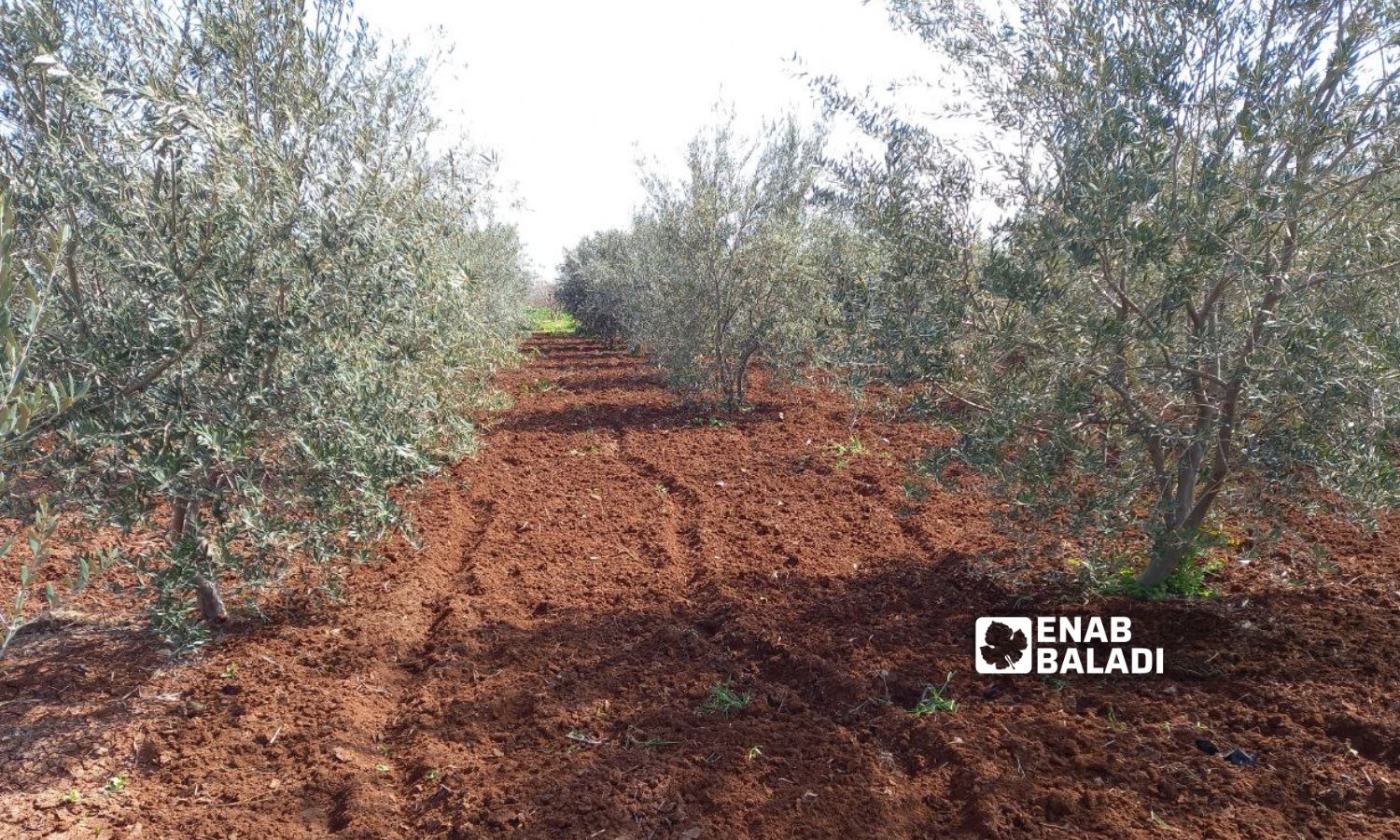



Daraa – Halim Muhammad
The prices of olive saplings have increased in the southern governorate of Daraa amid a demand by farmers to buy them, given that olives do not need large quantities of water compared to other crops, such as pomegranates, grapes, and citrus, due to the decrease in the quantities of irrigation water.
Some farmers resorted to replacing olive trees with pomegranate crops, as happened with Anas, 36, due to the decline in the water level of the wells and his inability to irrigate the pomegranate crop, which needs to be watered at least once every 20 days in the summer.
Olive is preferred over other crops, as it needs watering once every two months, as it is considered more resistant to thirst, and is in line with the drought that hit the wells and springs in Daraa, according to what Anas told Enab Baladi.
Enab Baladi monitored this case during the last period through a number of farmers in the area. Jaber, a farmer from rural Daraa, said that the lack of water had become a problem for all farmers in the governorate, especially since he was forced to replace grape vines with olive trees due to the same watering problem.
He added that the grape crop needs intensive watering, which he was unable to secure, as Jaber resorted to planting olives among grape trees as part of his agricultural project, and then uprooted grape trees successively in order to save water.
In light of the water crisis, the Daraa governorate witnessed during the winter a high demand for olive saplings, as Jaber bought more than a thousand saplings at a price of 4,500 Syrian pounds each (60 US cents).
The Associated Press reported in August 2021 a warning by international aid groups that millions of people in Syria and Iraq are at risk of losing access to water, electricity, and food amid rising temperatures and record low water levels due to lack of rainfall and drought.
“The two neighboring countries, both battered by years of conflict and mismanagement, are in need of rapid action to combat severe water shortages,” the groups said.
The drought is also disrupting electricity supplies as low water levels impact dams, which in turn impact essential infrastructure, including health facilities, the AP said.
Enab Baladi’s correspondent toured nurseries selling olive seedlings in Daraa and met Khaled Suleiman, an agricultural engineer who used to work as director of the Tal Shihab nursery for selling seedlings.
Suleiman told Enab Baladi that olive trees are more adaptable to the current conditions that the governorates of southern Syria suffer from after the decrease in irrigation water.
The engineer added that several varieties of olives were sought by farmers in the province, including table olives of a variety known locally as “Abu Shoka” and the “Istanbuli” variety used for eating and making oil, as farmers began to change their crops to grow olives recently.
Olives are long-lived trees and are more resistant to diseases, unlike other types of crops.
Small or newly established private nurseries are trying to secure olive seedlings for farmers who demand them in abundance, noting that securing them is the responsibility of the government of the Syrian regime through its public nurseries.
Before 2011, Daraa farmers used to import seedlings from public nurseries in Daraa governorate, the most important of which is the central nursery of Tal Shihab, which used to produce hundreds of thousands of seedlings annually and export them to the Syrian governorates and neighboring countries, and they were sold at symbolic prices that did not exceed half a dollar per plant.
In 2012, the Tal Shihab nursery was vandalized, which put it out of service after the regime forces lost control of the town.
In 2015, a cadre of agricultural engineers and workers affiliated with the Free Daraa Governorate Council was able to restore the production cycle through the support of the nursery by the Syria Essential Services Project. It produced nearly one million saplings, including 600,000 olive saplings, which were sold at nominal prices to farmers in the southern region.
After the regime forces took control of Daraa governorate, the nursery went out of service again, prompting farmers to resort to private nurseries at current prices.
Some former workers in agricultural nurseries established small projects to sell olive seedlings, benefiting from the experience they gained during their work years ago in “rooting olive cuttings,” that is, pruning small branches, then treating them with agricultural materials and replanting them to turn them into small seedlings.
Ahmed, 30, was a former employee at the government nursery of Tal Shihab. A few months ago, he established his small project to produce seedlings. With the start of the current season, he was able to sell about five thousand seedlings.
And on how to “root the olive cuttings” in the beginning, Ahmed said that he was able to secure a plastic house to provide a specific temperature for the crops, in addition to basins placed inside the plastic houses, filled with cow waste.
He continued, “We resort to the olive fields, and we cut off the branches that grow around the stem of the tree by a distance of 15 centimeters, and they are planted in (cow-waste basins) until their roots germinate, and then they are sold in the markets.”
if you think the article contain wrong information or you have additional details Send Correction